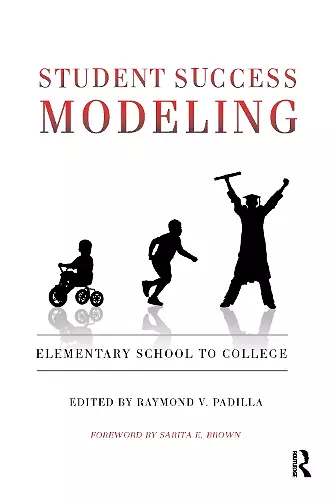Student Success Modeling
Elementary School to College
Format:Paperback
Publisher:Taylor & Francis Inc
Published:6th Nov '08
Currently unavailable, and unfortunately no date known when it will be back

This book focuses on one of the key questions in education: What determines a student’s success?Based on twenty years of work on student success, Ray Padilla here presents two related models he has developed that both provide a framework for understanding success and indicate how it can be enhanced and replicated. The research and theory that inform his models are covered in detail.He defines student success simply as progress through a program of study, such that the student and others expect him or her to complete it and be promoted to the next level or graduate. Rather than focusing on the reasons for failure or drop out, his approach focuses on understanding the factors that account for student success and that enable many students, some of them under the most challenging circumstances, to complete all program requirements and graduate. The models provide schools and colleges with an analytical tool to uncover the reasons for student success so that they can develop strategies and practices that will enable more students to emulate their successful peers. They address the characteristics of the students—such as motivation and engagement, the ability to surmount barriers, and persistence—and similarly surface the characteristics of teachers, the educational institution, its resources, and the contexts in which they interact. The process provides administrators with a clear and appropriate strategy for action at the level of each individual unit or subpopulation. Recognizing the need to develop general models of student success that also can be applied locally to specific situations and contexts, the book presents Padilla’s Expertise Model of Student Success (EMSS) that can be applied to general populations, as well as the Local Student Success Model (LSSM) that can be used to drive local institutional strategies to improve student success.The book demonstrates how the models have been applied in settings as diverse as a minority high school, a community college, and an Hispanic Serving Institution, and for such purposes as comparing a high-performing and a non high-performing elementary school. Contributors:* Kimberly S. Barker is an assistant professor at Texas A&M University-Kingsville, System Center San Antonio. She is currently working in the College of Education, Department of Curriculum and Instruction.* Mary J. Miller is the Instructional Compliance Director for the Edgewood Independent School District in...
"Focusing on the reasons for success in student performance rather than failure, Padilla (education and human development, U. of Texas at San Antonio) presents a framework for understanding student success and how it can be improved and replicated. He presents a general model and one for specific, local situations and how they have been applied in a minority high school, community college, and Hispanic-Serving University, and to compare high-performing and non- high-performing elementary schools. Chapters address the characteristics of students, teachers, and the school, its resources, and barriers to success. These chapters are based on the doctoral research of additional contributors who were Padilla's former students."
Book News Inc
“This book provides a new and much needed examination of college student success as a process that starts with elementary education, and requires specialized student expertise to overcome disadvantaging institutional structures and practices. What I find of greatest value about this book is the introduction of a model of student success that is sensitive to contextual circumstances and focuses on student agency to overcome barriers to their success. As Ray Padilla alludes, there are hundreds of correlational studies on pre-college characteristics as determinants of student success but we know very little about what goes on inside institutions that is enabling or disabling of students who lack the normative profile of the successful college student. Padilla’s model provides a critical perspective on student success: he takes it for granted that institutions are filled with visible and invisible obstacles that stand in the way of historically marginalized student populations. Accordingly, rather than asking the typical question: What student characteristics predict college success? He instead asks: What expertise do marginalized students possess that enables them to overcome institutional barriers to success?"
Estela Mara Bensimon, Professor of Higher Education in the division of Educational Policy and Administration, and Director of the Center for Urban Education
University of Southern California
“We welcome this book and the promise of the ideas and models offered to educators in our schools, colleges, and universities. With Student Success Modeling as a guide, educators will be able immediately to construct learning approaches that break through the limitations of current large scale assessments and build on all students’ potential for success.”
from the Foreword by Sarita E. Brown, President
Excelencia in Education
ISBN: 9781579223274
Dimensions: unknown
Weight: 358g
236 pages